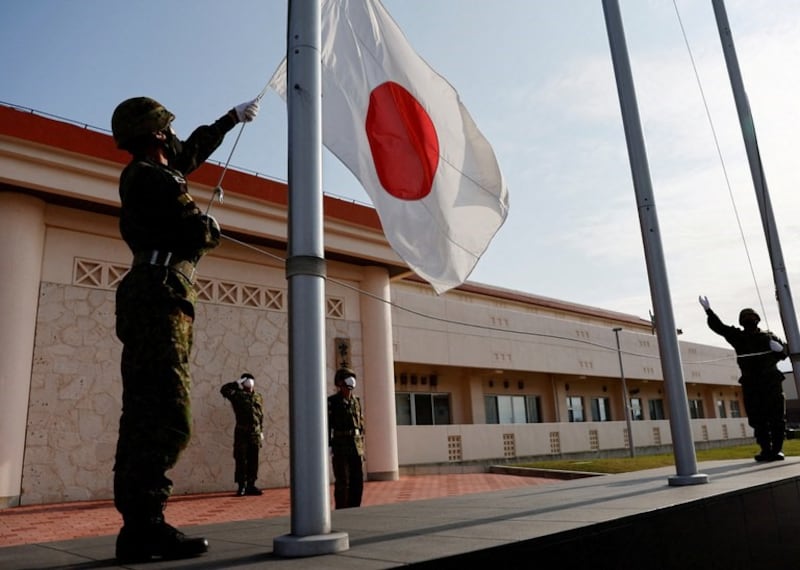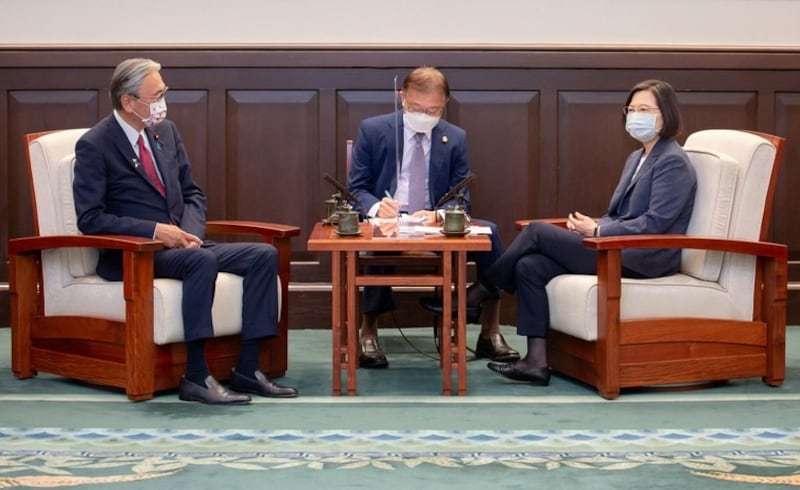Japan plans to beef up defenses on its remote islands in the East China Sea in preparation for a Taiwan Strait crisis, a move reflecting official strategic thinking but one that is likely to annoy China.
The Japanese defense ministry wants to expand fuel and ammunition storage facilities on the Nansei (Ryukyu) island chain, whose westernmost tip lies only 110 kilometers (68 miles) from Taiwan, Nikkei Asia quoted Defense Minister Yasukazu Hamada as saying this week.
Moving ammunition to the southwest would improve Japan’s deterrence capabilities, Hamada said, adding that an ammunition depot will be built on the island of Amami Oshima, located between Kyushu and Okinawa.
Port facilities and fuel depots will be set up in Okinawa, Kyushu and elsewhere to not only fulfill Japanese defense forces needs but support American forces responding to a Taiwan conflict.
The defense ministry also plans to bolster missile and electronic warfare capacity on the Nansei Islands, according to Japan's 2022 defense white paper.
Japan is setting up electronic warfare units at three locations on those islands this year. In 2023, one will be dispatched to Yonaguni, the Japanese island closest to Taiwan.
Yonaguni already hosts a military base with some 160 soldiers stationed there since 2016.
By March 2023, Japan will establish an army garrison equipped with anti-ship and surface-to-air missiles on Ishigaki island southwest of Okinawa. Similar units were already deployed to Amami Oshima island in 2019 and to Miyako island in 2020.

This year’s white paper has doubled the size of the Taiwan section, given the recognition that “the stability of the situation surrounding Taiwan is also critical for Japan’s security.”
“We’ve seen Taiwan migrate to the center or the near center of Japan’s security calculus when it comes to thinking about China, thinking about its potential ability to disrupt sea lines of communication technology supply chains and fundamentally transform the regional order,” said Stephen Nagy, a senior associate professor at the Department of Politics and International Studies at the International Christian University in Tokyo.
“A succession of politicians including the late Prime Minister Shinzo Abe, former Deputy Prime Minister Taro Aso as well as other prominent Liberal Democratic Party politicians have made strong statements linking Japan security to the security of Taiwan,” Nagy told Radio Free Asia (RFA), an online news service affiliated with BenarNews.
“What is different now is that they are clearly and openly articulating Japan's long-held view that Taiwan is a critical part of Japan's security and that forced reunification with Taiwan would be an existential threat to Japan,” the analyst said.
Shift in public opinion
“Even before Pelosi’s trip, in May this year, 90 percent of the Japanese respondents to a survey by Nikkei said Japan should be prepared for the possible military conflict in the Taiwan Strait; 41 percent said that the preparation could accompany a change in the law, and 60 percent accepted Japan having counterattack capabilities, despite such capabilities having invited controversies before,” said Fumiko Sasaki, a specialist in international relations focused on Asia and Japanese politics at Columbia University.
Last month’s trip to Taiwan by U.S. House Speaker Nancy Pelosi, the most senior American official to visit Taipei in 25 years, led to China holding a week-long military exercise around the island in retaliation.
During the drills, five Chinese ballistic missiles fell into Japan’s exclusive economic zone. This “demonstrated that the People’s Republic of China was clearly Japan's adversary, strengthening such Japanese attitudes,” Sasaki said.
“The Japanese government needs to reflect the shift in public opinion by taking actions to enhance Japan’s national security,” she said.

On Aug. 31, the Japanese Defense Ministry made its largest ever budget request of 5.59 trillion yen (U.S. $40.4 billion) for the 2023 fiscal year to deal with increased security challenges.
In June, Prime Minister Fumio Kishida said he intended to strengthen Japan’s defense capabilities “fundamentally over the next five years.”
“Skepticism on the U.S. commitment can lead to the acceptance amongst the Japanese public of not only further military buildup of its own but possible discussion about arming itself by nuclear weapons,” Sasaki explained.
“One of the lessons Japan has learned from the war in Ukraine is that the U.S. is hesitant to intervene in military conflicts once countries with nuclear weapons threaten to use them.”
“As happened with Taiwan, the Japanese people may well feel less confident in the U.S. intervention in contingency between Japan and China, which may be reflected in the overwhelming support of increasing preparation for a military conflict over the Taiwan Strait,” the New York-based analyst said.
In her opinion, “however strong the U.S.-Japan alliance is, their national interests differ,” and Japan should prioritize easing tension over the Taiwan Strait as instability in Asia would benefit nobody.
‘Hyping up Taiwan issue’
China, for its part, accused Japan of “following the United States’ repeated hype on the Taiwan issue.”
At a recent media briefing, Chinese foreign ministry spokesman Wang Wenbin said that during the past few months, "there have been a string of frequent negative moves concerning the Taiwan question from Japan."
By “supporting the U.S.’s erroneous action and making groundless accusations against China,” Japan is making “a gross interference in China’s internal affairs,” Wang said.
“The Taiwan question bears on the political foundation of China-Japan relations and the basic trust between our two countries,” the spokesman said, urging Japanese officials “to draw the lessons from history” and to abide by the commitments Japan had made.
Yet “Japan remains consistent in terms of its diplomatic engagement with China,” argued Tokyo-based Stephen Nagy, who said that by developing strategic partnerships with countries such as the U.S., Australia and the U.K., Japan aims at building “multi-layered, multinational deterrence capabilities within the region to push back against China’s assertive behavior.”
According to Japan’s 2022 defense white paper, “the overall military balance between China and Taiwan is tilting to China’s favor, and the gap appears to be growing year by year.”
“I do not think Japan will directly interfere with China or directly attack China or engage in provocative behavior towards China but it will continue to invest in deterrence resilience and engagement through robust diplomacy and multilateral partnerships,” Nagy said.
Japan’s possible involvement in Taiwan in the case of an armed conflict with China “would be very limited,” analysts said.
“Japan’s Constitution does not allow the deployment of military forces to other countries, so it would not be possible to deploy the Self-Defense Forces to the islands or territorial sea of Taiwan,” said Rena Sasaki, an East Asian security analyst based in Washington.
“In the absence of a direct attack on Japan, Japan can only provide logistical support to the U.S. military, such as support in the form of ammunition and repair of U.S. military equipment,” the analyst said.
However, “pressure from the U.S. and expectations from the international community may lead Japan to pass special measures legislation and increase its involvement in Taiwan,” she said.
Divisive opinions
Meanwhile, there are concerns among the public in the remote locations where the Japanese government wants to set up new military facilities.
Rena Sasaki herself visited an ammunition depot construction site on Miyako island in 2020 and said she witnessed the locals there “using an automated speaker to play a speech against the construction works.”
“Since the construction of an ammunition depot is said to increase the risk of an attack and cause environmental problems related to groundwater conservation, the locals have legitimate concerns,” she said.
Outside the southwest region, “there is not much public understanding of the deployment of ammunition depots and the risks associated with them.”
“Those who are concerned about the security of Japan would generally see it as positive developments because it will strengthen Japan's deterrence, while the majority of the public remain indifferent to it in the first place,” she said.

Seijiro Takeshita, a professor at the University of Shizuoka in Japan, said Japanese people are “far too naive about the Taiwan issue as the consequences of this happening to the region are still not fully understood or debated about.”
“Japan has to clarify its stance, not only externally but internally as well, that it is a part of the Western free world,” Takeshita said, adding: “There is no place of neutrality for Japan in this issue.”
Japanese lawmakers and Taiwan’s government have agreed to begin talks on how to evacuate more than 20,000 Japanese citizens living on the island in the event of a Chinese invasion, Japanese news agency Kyodo reported earlier this month.
“People take it for granted that a Chinese invasion will not happen. Maybe they should look at what is happening in Ukraine and Hong Kong,” Takeshita said.
